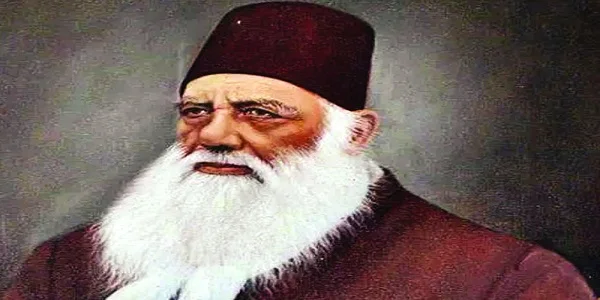Sir Syed Ahmad KHan
Sir Syed Ahmad Khan (1817-1898) was a prominent and visionary figure in 19th-century India who played a pivotal role in the socio-economic and educational upliftment of the Muslim community. His multifaceted contributions spanned various fields, including education, social reform, and political thought. Born during a time of profound social and political change in India, Sir Syed Ahmad Khan emerged as a reformer, educator, and advocate for the rights and progress of Muslims in the subcontinent.
Life and Background:
Sir Syed Ahmad Khan was born on October 17, 1817, in Delhi, during the declining years of the Mughal Empire. His family belonged to the Mughal nobility, and he was raised in an environment steeped in Persian and Islamic culture. The political upheavals of the time, including the Indian Rebellion of 1857, deeply influenced his outlook and later shaped his reformist agenda.
Educational Reforms:
One of Sir Syed Ahmad Khan's most significant contributions was in the field of education. Witnessing the decline of traditional Islamic education and the need for modern knowledge, he sought to bridge the gap between the two. In 1864, he founded the Muhammadan Anglo-Oriental College in Aligarh, which later evolved into the Aligarh Muslim University (AMU). The institution aimed at providing modern education to Muslims while incorporating Islamic studies.
Sir Syed emphasized the importance of scientific and English education to empower the community and foster a spirit of inquiry. He understood that educational empowerment was the key to social and economic progress. The Aligarh movement, which he spearheaded, aimed at creating a modern Muslim intelligentsia that could engage with the changing socio-political landscape of British India.
Social Reforms:
Apart from his educational endeavors, Sir Syed Ahmad Khan was a staunch advocate of social reforms within the Muslim community. He recognized the need to adapt to the changing times and advocated for a more pragmatic interpretation of Islamic teachings. He believed in the compatibility of modernity and Islam, emphasizing that Muslims should embrace scientific and technological advancements without compromising their faith.
Sir Syed worked towards the eradication of social evils prevalent in the community, such as purdah (veil) system, polygamy, and ignorance. He promoted female education and discouraged practices that hindered the progress of Muslim women. His efforts aimed at fostering a sense of social responsibility and rational thinking among Muslims.
Literary Contributions:
Sir Syed Ahmad Khan was not only a social and educational reformer but also a prolific writer and scholar. He wrote extensively in both Urdu and English, contributing to literature, history, and science. His literary works include the seminal Asar-us-Sanadid, a groundbreaking study on Mughal architecture, and the Asar-us-Sanadeed ki Nama-i Nasiri, a detailed history of Delhi.
His literary contributions were not confined to historical and architectural subjects. Sir Syed wrote on a variety of topics, addressing issues such as education, socio-economic conditions, and the need for modernization. His writings reflect his progressive and pragmatic approach to societal issues.
Political Outlook:
While primarily known for his educational and social contributions, Sir Syed Ahmad Khan was also a keen political thinker. Living in a period marked by the decline of the Mughal Empire and the emergence of British colonialism, he recognized the importance of political awareness and unity among Muslims. He encouraged Muslims to engage with the British government through education and administrative participation.
However, he advocated a policy of reconciliation and cooperation with the British rather than confrontation. His political stance was characterized by a pragmatic approach that sought to protect the rights and interests of Muslims within the framework of British rule.
Legacy and Impact:
Sir Syed Ahmad Khan's legacy is enduring and far-reaching. His efforts in the field of education laid the foundation for the development of Aligarh Muslim University, which continues to be a prestigious institution in India. AMU has produced numerous scholars, professionals, and leaders who have contributed significantly to various fields.
His advocacy for social reforms and emphasis on modern education have had a lasting impact on the Muslim community in India. The Aligarh movement, initiated by Sir Syed, inspired subsequent generations of Muslim leaders to engage with modernity while retaining their cultural and religious identity.
Sir Syed Ahmad Khan was a visionary leader who played a transformative role in the socio-economic and educational development of Muslims in 19th-century India. His emphasis on modern education, social reforms, and a pragmatic approach to political issues set the stage for the empowerment of the Muslim community. Sir Syed's legacy continues to resonate in the form of educational institutions like Aligarh Muslim University and the broader impact on the social fabric of India. As a reformer, scholar, and statesman, Sir Syed Ahmad Khan's contributions remain integral to the narrative of India's history and its quest for progress and inclusivity.

